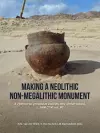
Making a Neolithic Non-megalithic Monument
3 contributors - Paperback
£45.00
Henk van der Velde is head of Archaeology of ADC ArcheoProjecten, a Dutch archaeological firm. He is also director of the ADC-Stichting RoelBrandt and affiliated to several universities in the Netherlands and Belgium. He obtained his PhD at the Free University (Amsterdam) on the Long term history of Pleistocene coversand area in the East of the Netherlands (2011). His research stretches from the later Prehistory until the Early Middle Ages. Key publications Velde, H.M. van der, 2008: The Early Bronze Age farmstead of Noordwijk, Arnoldussen, S. & H. Fokkens (eds), Bronze Age settlements in the Low Countries, Oxford, 167-175. Velde, H.M. van der, 2011: Wonen in een grensgebied. Een langetermijngeschiedenis van het Oost-Nederlandse cultuurlandschap (500 v. Chr-1300 na Chr.), Amersfoort. Velde, H.M. van der & S. Heeren, 2017: On the origins of Dorestad? Habitation of the Kromme Rijn area during the Merovingian Period, S. Semple, C. Orsini & Sîan Mui (eds),Life on the edge: Social, Political and Religious Frontiers in Early Medieval Europe (proceedings of the 63. Sachsensymposium in Durham). Velde, H.M. van der & G.L. Williams, 2019. Early medieval burial grounds in the East of the Netherlands, Annaert R. et al (eds), Early medieval waterscapes. Risk and opportunities for (im)material exchange ( Neue Studien der Sachsen Forschung 8, 221-234. (proceeding of the Sachsensymposium 2016 in Antwerp). Niels Bouma is senior archaeologist and works as project manager at ADC ArcheoProjecten (2007 until present). He was involved in numerous developer-led projects in the Netherlands and Belgium including the Dalfsen site. Daan Raemaekers is full professor of archaeology of northwestern Europe at the Groningen Institute of Archaeology, University of Groningen. He obtained his PhD on the role of the Swifterbant culture in the transition to farming in northwestern Europe from Leiden University in 1999. In the period 1998-2002, he worked as project manager at RAAP Archaeological Consultancy and was involved in numerous developer-led projects in the province of Flevoland. He was appointed full professor at the University of Groningen in 2002. His academic work focuses on four interrelated topics: the transition to farming in northwestern Europe, the development of Neolithic societies in this area, the function and meaning of ceramics in this period and the role of prehistory in present-day societies. He has carried out fieldwork at several sites in the Swifterbant region and near megalithic tombs. He is the principal investigator of the project The Emergence of Domesticated Animals in the Netherlands (EDAN), financed by the Dutch Organisation for Scientific Research NWO (2020-2022). Key publications Demirci, O., Lucquin, A., Çakirlar, C., Craig, O. E., & Raemaekers, D. C. M. (2021). Lipid residue analysis on Swifterbant pottery (c. 5000-3800 cal BC) in the Lower Rhine-Meuse area (the Netherlands) and its implications for human-animal interactions in relation to the Neolithisation process. Journal of Archaeological Science: Reports 36, 102812. D.C.M. Raemaekers, L. Kubiak-Martens, T.F.M. Oudemans, 2013. New food in old Pots – charred organic residues in Early Neolithic ceramic vessels from Swifterbant, the Netherlands (4300-4000 cal. BC), Archäologisches Korrespondenzblatt 43(3), 315-334. Schepers, M., J.F. Scheepens, R.T.J. Cappers, O.F.R. van Tongeren, D.C.M. Raemaekers & R.M. Bekker, 2013. An objective method based on assemblages of subfossil plantmacro-remains to reconstruct past natural vegetation: a casestudy at Swifterbant, The Netherlands, Vegetation History and Archaeobotany 22(3), 243-255. Huisman, D.J., A.G. Jongmans en D.C.M. Raemaekers, 2009. Investigating Neolithic land use in Swifterbant (NL) using micromorphological techniques, Catena 78, 185-197. Cappers, R.T.J. & D.C.M. Raemaekers, 2008. Cereal cultivation at Swifterbant? Neolithic Wetland Farming on the North European Plain, Current Anthropology 49(3), 385-402.